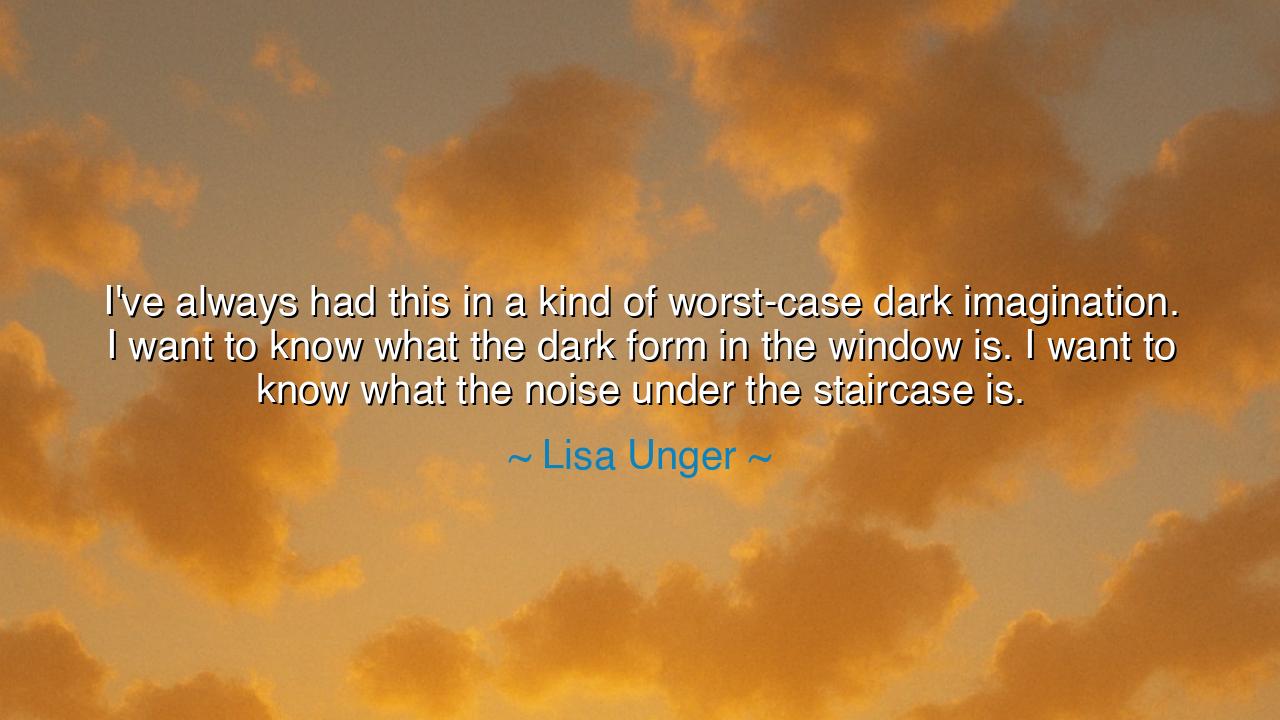
I've always had this in a kind of worst-case dark imagination. I
I've always had this in a kind of worst-case dark imagination. I want to know what the dark form in the window is. I want to know what the noise under the staircase is.






“I’ve always had this in a kind of worst-case dark imagination. I want to know what the dark form in the window is. I want to know what the noise under the staircase is.” Thus spoke Lisa Unger, the modern chronicler of mystery and suspense, whose stories lead us into the trembling corridors of the human psyche. Yet within these words lies not mere curiosity for horror, but a profound human truth: that we are creatures both drawn to and terrified by the unknown. The same force that compels us to shrink from the dark also drives us to pierce it with the light of understanding. What Unger calls her “dark imagination” is not a curse but a calling — a yearning to uncover the hidden, to face fear and transform it into knowledge.
Since the dawn of humankind, the darkness has been both enemy and teacher. When the first people gathered around their fires, the shadows beyond the flames whispered with unseen dangers. The roar in the distance, the rustle in the brush, the figure glimpsed at the edge of light — all were mysteries that provoked the earliest stirrings of the imagination. To survive, one had to name the darkness, to turn the unknown into something comprehensible. Thus were born both the myths that gave meaning to terror and the sciences that sought to dispel it. Lisa Unger’s fascination with the “dark form in the window” is the modern echo of that same ancient instinct — the drive to illuminate what frightens us.
In her quote, Unger reveals that the imagination is not always a gentle or comforting gift. It can descend into the shadowed places of the mind, summoning monsters and phantoms from the depths of fear. Yet these imagined terrors serve a purpose. They are the psyche’s way of probing its own boundaries, of asking, “What lies beyond the safe and known?” The artist, the philosopher, the scientist — all share this same courage of curiosity. They look into the dark, not to indulge despair, but to uncover truth. The child who dares to peek beneath the bed to see what makes the noise becomes, in spirit, the explorer, the poet, the seeker of hidden knowledge.
Consider, then, the story of Mary Shelley, who, like Unger, embraced her “dark imagination.” On a storm-lashed night in Switzerland, surrounded by poets and dreamers, she conceived of a tale that would pierce the veil between life and death. From her fear, she created Frankenstein — a story not merely of horror, but of the moral and spiritual consequences of human ambition. Shelley’s dark imagination became the womb of new understanding, forcing readers to ask what it means to be creator and creature. Like Unger’s vision of “the noise under the staircase,” Shelley’s monster was born from the question no one dared to ask — and that courage to ask transformed the world of literature forever.
So too, in every age, do the great minds dare to look where others avert their eyes. The astronomers who sought to map the heavens risked the wrath of dogma. The psychologists who explored the mind’s shadows uncovered truths too uncomfortable for their times. Even the heroes of old — Odysseus, Beowulf, Gilgamesh — are remembered not for avoiding the dark, but for venturing into it. They faced the monsters that dwelled beyond the firelight and, in doing so, brought their people wisdom. So it is with Lisa Unger and all who possess a “dark imagination”: they walk willingly into the unknown, guided not by fear, but by the desire to understand what fear itself conceals.
The lesson in these words is not to flee the darkness within or around us, but to explore it. The things we fear — whether they are shadows of the past, mysteries of the heart, or secrets of the world — hold power over us only when we refuse to confront them. To ask, as Unger does, “What is the dark form in the window?” is to take the first step toward freedom. For every act of inquiry is an act of light. The poet who writes of sorrow, the scientist who questions death, the dreamer who faces despair — all are warriors of the imagination, wielding curiosity as their sword.
Thus, remember this, O seeker of wisdom: do not despise your dark imagination. It is not an affliction but a lantern. To deny it is to remain forever afraid of what stirs beneath the staircase; to embrace it is to find the courage to descend and see. For in that seeing lies transformation. The imagination, when it dares to wander into the night, discovers not only monsters but miracles. It teaches us that the light we seek has always been our own — waiting to be kindled by the very questions we fear to ask.
And so, as Lisa Unger reminds us, dare to wonder, even when wonder leads you into darkness. Ask, seek, uncover. Let your imagination guide you into the places the timid do not go, for only there will you find truth — and in truth, the quiet glory of understanding.






AAdministratorAdministrator
Welcome, honored guests. Please leave a comment, we will respond soon